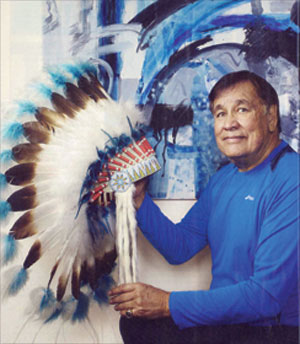Olympic gold medalist speaks at Convocation
January 1, 2012

Billy Mills, whose come-from-behind sprint victory at the 1964 Tokyo Olympics ranks among the most astounding in Olympic track history, is the keynote speaker at Central Wyoming College’s 2012 Convocation Thursday, August 30.
Mills, an Oglala Lakota raised on the Pine Ridge Reservation in South Dakota, addresses an expected full house at 10 a.m. in the Robert A. Peck Arts Center Theatre.
The only American to win an Olympic 10,000 meter race, Mills was shoved to the outside lane by the lead runner and discovered the cinder track on the outside lanes were much firmer than the chewed-up, pulverized inside lanes. “So when I rocketed out wide in the homestretch, I could really fly, really be rewarded for all my speed training,” said Mills in a March 2012 article published in Runners World. See his historic run.
Mills quit running competitively after he failed to make the 1968 Olympic team but his story of his run for the gold has kept him traveling almost 300 days a year speaking to audiences around the world.
He was the youngest of seven children, born to a white mother and Native American father. He was orphaned by the time he was 12 and raised by his older siblings. At 15, he was sent to the Haskell Institute, a boarding school for Native Americans in Lawrence, Kansas where he took up cross country and track. He was later recruited by the University of Kansas where he met his wife Patsy Harris.
After graduating from KU, Mills wanted to train for the Olympics but his wife was pregnant with their first child so he decided to join the Marines, which had a track team and coach. That would give him just over a year and a half to make the Olympic team.
Mills matured as a runner under Marine Corp coach Tommy Thompson who gave him the encouraged to go for the gold. He made the American team for the 1963 world military championships where he ran the 10,000 meters and was outkicked by Mohamed Gammoudi of Tunisia, who through an interpreter, advised Mills to include speed workouts.
Mills’ college coach Bill Easton had discouraged him from trying more speed work, telling him “Negroes are sprinters, and Indians run forever.” With the advice of the Tunisian, who ironically Mills beat in the Olympics, he adjusted his training to add speed workouts and eventually cracked 50 seconds for 400 meters.
The father of four daughters and grandfather to 11, Mills now live with his wife in Fair Oaks, Calif. He and wife Pat wrote a book on his road to the Olympics called Run for the Red Willows. No publisher bought it, but the manuscript was picked up by a movie producer and the film Running Brave was released in 1983.
In 1986, he founded Running Strong for American Indian Youth and the organization’s accomplishments are vast. The foundation has drilled multiple water wells on the Pine Ridge Reservation as wells as homes for the elderly and dialysis clinics. The foundation also endowed the Billy Mills Youth Scholarship at the KU for American Indian students majoring in education.
The Convocation ceremony is followed by a community picnic that includes a Native American dance exhibition by the Derryl Lonebear family. Mills is honored at St. Stephens School following the picnic.